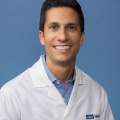FINDINGS
About 60% of healthcare workers participating in an optional rapid antigen testing program at UCLA tested positive at day five, and about 50% were positive at day seven after initially testing positive for COVID-19 with a PCR test. The results indicated those with positive tests were more likely to be infectious and were not allowed to return to work until after 10 days of isolation.
BACKGROUND
A surge in COVID cases in December 2021 led to a shortage of healthcare workers across the U.S. While the isolation period to reduce transmission has changed during the pandemic based on various factors, the U.S. Centers for Disease Control and Prevention (CDC) on Dec. 23 had shortened the isolation period’s length to five days from symptom onset, with or without a negative COVID test, during times of critical staffing shortages. This prompted the researchers to undertake this study. The CDC recently changed the healthcare return-to-work guidance.
PCR tests detect viral nucleic acids (RNA) and are used for diagnosing COVID. Those nucleic acids can, however, continue to be detected beyond the point when someone is still infectious. The antigen test detects proteins from the actual virus, which is typically only present when infectious virus remains, making them a better proxy than the PCR test for indicating infectiousness.
METHODS
From Dec. 25, 2021 to Feb. 4, 2022, UCLA Health ran an optional program in which 870 healthcare workers with COVID and were asymptomatic or mildly symptomatic with improving symptoms could return to work after five days of isolation if a subsequent antigen test for SARS-CoV-2 was negative. They underwent the rapid antigen test five or more days after their initial positive COVID PCR test.
Some limitations to the findings include an inability to perform viral cultures or repeat PCR tests and a lack of data on infections that may have occurred during work hours, though that risk was likely low due to masking and the fact that workers were allowed to return only after a negative test. Also, only about 37% of the 2,316 UCLA healthcare workers who had positive PCR tests during the period volunteered for the optional antigen testing program.
IMPACT
The findings demonstrate how the rapid antigen test can be used to triage healthcare workers for returning to work during periods of acute staffing shortages during COVID surges. They also show that a majority of health care workers remain antigen positive five to seven days following COVID-19 infection. Other healthcare systems can also look to these findings as they implement their own return-to-work testing programs.
COMMENT
“Antigen tests correlate well with being infectious, so these tests were able to identify healthcare workers who might have still been infectious following a COVID infection,” said lead author Dr. Paul Adamson, assistant professor of medicine, division of infectious diseases, at the David Geffen School of Medicine at UCLA “The antigen test positivity was higher than we initially expected following the isolation period.”
AUTHORS
Study co-authors are Dr. Judith Currier, Dr. Daniel Uslan, and Omai Garner of UCLA.
JOURNAL
The is published in Open Forum Infectious Diseases




